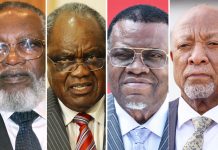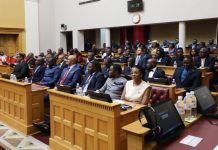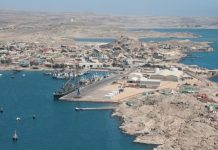By Shinovene Immanuel, Lazarus Amukeshe and Victoria Wolf | 30 July 2020
INVESTMENT firms Pointbreak Wealth Management and IJG Securities say they were not beneficiaries of transactions made by two Fishrot-linked firms.
The Namibian reported last week that Namibian companies implicated in the Fishrot scandal transferred close to N$100 million to prominent financial investment firms in the past six years.
The investment companies are IJG Securities (N$61 million), Pointbreak (N$23 million) and Investec Asset Management Namibia (N$10 million).
That report was based on documents submitted to court by the Anti-Corruption Commission and comments made by former minister of fisheries and marine resources Bernhard Esau’s lawyer, Richard Metcalfe.
ACC director general Paulus Noa also confirmed they are still busy obtaining evidence relating to the flow of money to implicated companies.
Two of the investment firms took offence at some words used in the article, saying it made it look as if the companies were beneficiaries of the transactions when The Namibian said they were “paid”.
The third company – Investec Asset Management Namibia (Now renamed Ninety One Asset Management Namibia) – sent a letter through their lawyers demanding that the newspaper retracts and apologises for the story.
The company, without providing evidence to the contrary, said they could not trace the N$10 million allegedly transferred to it.
POINTBREAK
Pointbreak, owned by FNB Namibia, said it administers client investments based on client instructions.
“Pointbreak is never the beneficial owner of client investments,” Pointbreak Group chief executive officer Josephat Mwatotele said on Sunday.

“The inference and the choice of words in the article that Pointbreak was paid or received funds for its benefit (save for administration and/or management fees earned on investments under its administration) is therefore incorrect,” he says.
“This is the key issue to the story and paints a picture of us being beneficiaries of illicit funds outside our normal course of business”.
Court documents show that DHC Inc and Celax, co-owned by lawyer Marén de Klerk, allegedly transferred N$23 million to Pointbreak in six years.
Pointbreak in turn transferred around N$16 million to DHC Inc.
Mwatotele said the Fishrot scandal is well known in Namibia. He said the use of his photo alongside the article was not necessary.
“The publishing of specifically the photographs of the Ashburton/Pointbreak CEO and that of another CEO in the industry on the front page of the newspaper in conjunction with the Fishrot-related article and the implied link this tried to create for the sake of sensationalism, is at best deplorable,” he said.
“We believe it is important and fair to give your readers the correct context that the use of the individual picture of the Ashburton and IJG CEOs were not in reference to any wrongdoing or personal involvement on their part but as result of the lack of context might have created the wrong public perception”.
Pointbreak said the previous article was wrong to state that they did not respond to questions sent to them since the deadline given to them was 22 July 2020 — the same day the article was published. This is an error The Namibian regrets.
Mwatotele said Pointbreak adheres to the various regulatory requirements as set out in various laws, such as the Financial Intelligence Act and Anti-Corruption Act.
“These regulatory requirements, among others, require financial institutions to verify the identity of clients, to establish the source of funds and to cooperate with the authorities regarding the reporting and investigation of suspicious transactions,” he said.
IJG
The same article said the largest beneficiary (N$61 million) of the N$100 million transferred by Celax Investments and DHC Inc was IJG Securities, as per court documents.
The investment firm, however, said they were not beneficiaries of the funds.
The IGJ board issued a statement on Monday, saying the money was not for them since they are only brokers.
“Other than payment to IJG of brokerage fees, which is lawful industry practice, IJG has not been a ‘beneficiary’ of any funds allegedly relating to the Fishrot scandal as insinuated in the article,” reads the letter.
IJG said they provide independent, third party savings and investment services to clients and that all investment funds flow through the formal banking system.
IJG merely acts as an agent to provide clients with more competitive returns and service, the board said.
The Namibian reported last week that detailed questions sent to IJG CEO Mark Spath via email were not answered.

The company said they did not receive the questions via email and therefore could not address unmentioned inaccuracies in the article.
The board said IJG upholds the highest standards and ethics and strongly refutes any wrongdoing.
“As with all reputable investment firms, we cannot comment in detail on any client transactions,” it said.
NINETY ONE
Last week’s article also reported that law firm DHC Inc, a law firm implicated in fraud and money laundering allegations as part of the Fishrot scandal, transferred N$10 million to Investec Asset Management Namibia (now known as Ninety One Asset Management Namibia).
Court documents said N$44 000 was sent back to DHC Inc.
Ninety One Asset Management Namibia wrote a letter on Monday through their lawyers, demanding that The Namibian retracts the article and apologises for it.
“What is stated in the article published is without any factual foundation and indeed untrue,” said a letter by Mark Kutzner of Engling, Stritter and Partners.
The letter further said that Ninety One conducted an “extensive investigation” into its accounts and that no transactions were received or made by Marén de Klerk, Celax, or DHC Inc between 2014 and 2019.
The company said they found that no such transactions as described in the newspaper article could be traced on their client’s corporate or client accounts.
The company did not prove or provide access to how they made these conclusions.
Ninety One requested that The Namibian publishes an apology and a retraction of the alleged transactions as well.
On behalf of his client, Kutzner also claims that Ninety One could not respond in detail to the allegations prior to publication, because no precise dates were provided by the newspaper.
He said the ACC documents used by the publication were not provided to Ninety One prior to the article’s publication.
“Our client wishes to stress that it remains committed to fully cooperate with the authorities in their investigation into the Fishrot scandal. However, that does not mean that our client will tolerate untrue allegations being made against it in your newspaper.”
Lawyer Richard Metcalfe referred to the document that outlines the flow of Fishrot funds in court last week.
Metcalfe said yesterday that ACC officials Willem Olivier and Karl Cloete would not stoop so low as to lie in a court of law.
He added that if the asset managers were correct that there were no transactions as indicated in court documents, then “it would mean that the ACC is misleading the honourable court and the public”.






